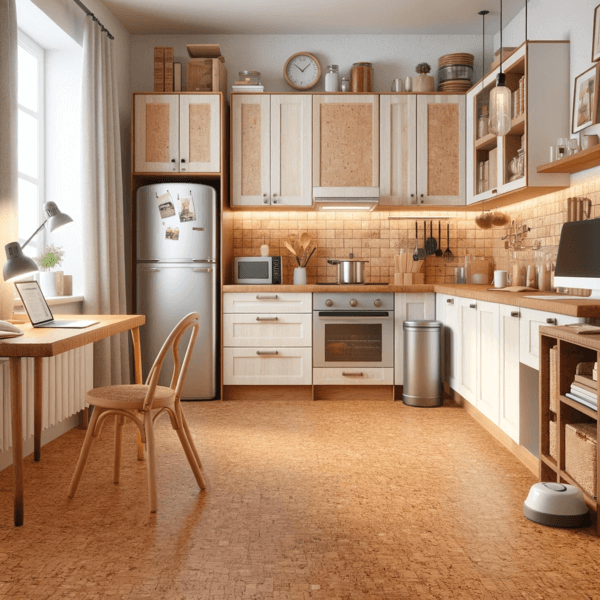FREE DELIVERY ON UK ORDERS OVER £60.00 *except on Interior Design & Construction Products
Here's why cork floors are very durable

Even those of us who are enthusiastic about floorings – and we do exist – aren't particularly keen on the idea of having to replace ours every now and then. So, when it comes to making a choice, longevity is paramount in everyone’s mind.
Cork floorings have been gaining popularity – they look great, and cork possesses unique qualities that make it an ideal flooring material. But one of the most frequent concerns is: are they durable?
Let's try to find out.
Cork's composition
Cork is made from the bark of the cork oak tree. We should note in passing that this is a renewable resource and an environmentally friendly choice. The layer of bark grows back with time and is harvested without harming the tree. One point for cork!
The natural, organic structure of cork consists of millions of cells that act like tiny air-filled compartments. It is this structure that gives cork its natural malleability and resilience.
Impact and Scratch Resistance
Cork has a reputation for resistance to cracks and abrasions compared with other flooring materials. This is due to its characteristic flexibility, which allows it to absorb shocks and take them in its stride.
While these floorings are not scratch-proof – and in fact, you should remember to avoid dragging heavy furniture or applying strong pressure from sharp objects – they are less vulnerable to scratches than hardwood floors.
This is again due to the natural elasticity of cork, which gives it the capacity to bounce back from minor scratches and makes them unnoticeable. We’ll discuss what to do in case there are noticeable scratches below.
Cork offers microbe resistance
Cork is also resistant to mold, mildew, and pests, owing to a chemical substance named suberin in its composition. This may become extra useful in humid climates and in areas prone to water spills.
Fire resistance properties
Cork is resistant to fire and does not easily ignite, as anyone can verify for themselves by trying to set a stopper from a wine bottle on fire. It tends, in fact, to slow down the spread of flames.
Even when exposed to direct flame, it produces less smoke and toxic fumes than other materials.
How to maintain a cork floor
How long your flooring will last depends in part, of course, on how well you take care of it. In any case, maintenance of cork is not complex: simple regular cleanings by sweeping or vacuuming, to remove dirt and grit that may wear down the surface, will be quite adequate.
Also, always try to promptly wipe up any liquid spills, to prevent staining or damage to the material, in case it seeps through.
An additional tip is to use mats or rugs in high foot-traffic areas, for added protection against wear.
Sealing and Refinishing
New cork floorings usually come pre-sealed, but ideally, you should reseal yours every few years, to provide an additional defensive barrier against stains and moisture infiltrations.
Eventually, you may also want to consider refinishing, which involves sanding the surface and applying a new finish. This helps to repair scratches and restore the appearance of the flooring.

Factors affecting cork's durability
There are a few general factors which can also impact your flooring’s lifespan, the most important of which are the quality of the cork, the type of finish used, and the atmospheric conditions. It’s important to know them, so you know what to look for.
Cork of a higher quality will, usually, last longer than a cheaper alternative, on account of a higher density and thicker wear layer.
As for the type of finish, polyurethane offers a hard, protective layer, and is therefore preferable from the point of view of durability. Wax finishes, on the other hand, will give your flooring a softer, more natural look, but may require more maintenance.
Finally, regarding the atmospheric conditions, controlled environments with consistent humidity levels are ideal, as extreme changes in humidity can cause cork to expand or contract, which with time may result in damage.
Conclusion
We can’t apply the “carpe diem” philosophy to everything in life. Sometimes, we really have to think about the future. Like when it comes to floorings.
Thanks to its unique composition and natural resilience, cork can last for a very long time. Don’t forget our tips about maintenance and clean up your flooring regularly, to help keep it as good as new.
Your new cork flooring will be durable, resilient, and stand by your side – or rather, under your feet – for many decades to come.













